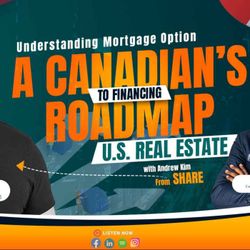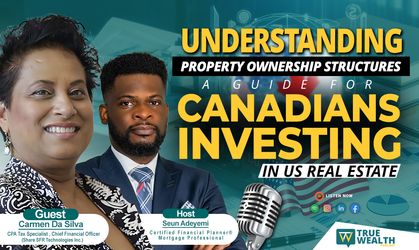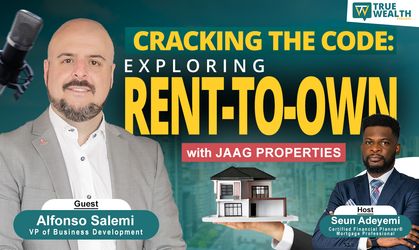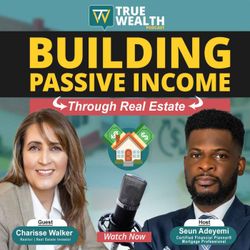Share

True Wealth Podcast
Maximizing Your Charitable Efforts Using Donor Advised Funds - Part 2
Season 3, Ep. 8
•
Featured on today’s episode: Lorne Jackson, former broker dealer and financial planner, founder of the Canadian National Christian Foundation (CNCF)
We are all familiar with foundations as a means to donate money, but on today’s episode you will learn about a less well-known method of donating: Donor Advised Funds and how they can work for you.
What You'll Learn from This Episode:
- An introduction to Donor Advised Funds
- An introduction to the Canadian National Christian Foundation (CNCF) : who they are ,what they do, and how they can be incorporated into your financial plan
- The difference between a public and a private foundation
- How donor advised funds can be a beneficial tool when planning your estate
Featured on the Show:
- Lorne Jackson – info@cncf.ca
- CNCF
Follow Us
More episodes
View all episodes

How You Can Earn a 6-figure Passive Income in Real Estate
26:17|Summary:In this episode, Andrew Kim discusses different ways to earn a six-figure passive income in US real estate investment. He explains how Canadians are turning to US real estate due to high home prices and restrictive landlord laws in Ontario and BC. Andrew outlines a 10-year strategy that involves buying multiple properties, refinancing, and reinvesting the cash flow. He also discusses the use of HELOCs to accelerate the portfolio growth. The goal is to achieve a sustainable portfolio of up to 15 homes that generate a six-figure passive income.Keywords:real estate investment, passive income, US real estate, Canadian investors, HELOC, portfolio growthTakeaways:Canadians are turning to US real estate due to high home prices and restrictive landlord laws in Ontario and BC.A 10-year strategy involves buying multiple properties, refinancing, and reinvesting the cash flow.HELOCs can be used to accelerate portfolio growth and allow for the purchase of fixer-upper properties.The goal is to achieve a sustainable portfolio of up to 15 homes that generate a six-figure passive income.Titles:The Benefits of Investing in US Real Estate for CanadiansAccelerating Portfolio Growth with HELOCs: A Path to Six-Figure Passive IncomeSound Bites:"Getting a lot of influx from Canadians looking for direct real estate ownership, but realizing that the numbers and the laws are not working in their favor to invest locally.""Canadians are using the HELOC to accelerate. So now they've got this extra tranche of capital, they can buy homes with quote unquote all cash because they're buying outright their HELOC.""Real estate is a slow climb. It's not a get rich quick scheme. It does take time. You want the markets to improve, you want to diversify."Chapters:00:00 - Introduction and Overview07:19 - Slow Climb: The Long-Term Approach to Real Estate Investment13:13 - Being Aggressive: Front-Loading Investments and Accelerating Growth24:48 - Conclusion and Closing RemarksFeatured on the Show: Andrew Kim CEO & Co-Founder for SHARE Website: Website: https://twa.sharesfr.com To schedule a call with us! Click here to book a convenient time for a discussion: https://calendly.com/sfrteam/twa For more information about Mortgage and Financial Planning services, visit our website: https://www.realty.truewealthadvisors.ca/To schedule an appointment with us, click here: https://truewealthadvisors.ca/schedule👉 Subscribe to our channel. And press the bell 🔔 icon. 🔗 https://www.youtube.com/@TrueWealthREAdvisors/featured?sub_confirmation=1 Thank you for supporting “True Wealth - Real Estate Investing for Canadians ” you can follow us on the Social Media Links Below: ✔ TikTok: tiktok.com/@truewealthrealtyadvisors ✔ LinkTree: linktr.ee/TrueWealthAdvisors ✔ Facebook: facebook.com/TrueWealthCA ✔ First Time Home Buyers: truewealthadvisors.ca/securemyhome ✔ Free Guide: truewealthadvisors.ca/mistakestoavoid ✔ Website: realty.truewealthadvisors.ca
"Profitable Foundations - Mastering Real Estate Metrics for Success”.
35:12|In this episode, Seun Adeyemi and Dmitri Bourchtein discuss the importance of metrics in real estate investing. They cover topics such as purchase price, location, rental income, expenses, net operating income (NOI), cap rate, cash on cash return, and internal rate of return (IRR). They emphasize the need for diversification and the importance of working with knowledgeable professionals to make informed investment decisions.Takeaways:Understanding the metrics of real estate investing is crucial for making informed investment decisions.Metrics such as purchase price, location, rental income, expenses, net operating income (NOI), cap rate, cash on cash return, and internal rate of return (IRR) help evaluate the profitability and risk of an investment.Diversification is key in real estate investing to mitigate risk and maximize returns.Working with knowledgeable professionals, such as financial planners and real estate experts, can provide valuable guidance and help create a holistic investment strategy.Featured on the Show: Dmitri Bourchtein, Co-Founder & Chief Investment Officer (Share SFR Technologies Inc.)Website: https/twa.sharesfr.com To schedule a call with us! Click here to book a convenient time for a discussion: https://calendly.com/sfrteam/twa-----------------------------------------------------------------------------------------------------------------------------------------------------------------------------------------------------------------------For more information about Mortgage and Financial Planning services, visit our website: https://www.realty.truewealthadvisors.ca/To schedule an appointment with us, click here: https://truewealthadvisors.ca/schedule👉 Subscribe to our channel. And press the bell 🔔 icon. 🔗 https://www.youtube.com/@TrueWealthREAdvisors/featured?sub_confirmation=1 Thank you for supporting “True Wealth - Real Estate Investing for Canadians ” you can follow us on the Social Media Links Below: ✔ TikTok: tiktok.com/@truewealthrealtyadvisors✔ LinkTree: linktr.ee/TrueWealthAdvisors✔ Facebook: facebook.com/TrueWealthCA✔ First Time Home Buyers: truewealthadvisors.ca/securemyhome✔ Free Guide: truewealthadvisors.ca/mistakestoavoid✔ Website: realty.truewealthadvisors.ca #realestateinvesting #realestateinvestingforbeginners #realestate #whytheusrealestatemarketismorelucrativethanthecanadianmarket #usrealestatemarketvcanadianrealestatemarket🚫Disclaimer: Don't Try To Download & Copy Anything From This Channel. It's aCyber Crime. All Videos of this Channel are Copyrighted by True Wealth - RealEstate Investing for Canadians Thank you for watching this video, 👇click the "🆂🆄🅱🆂🅲🆁🅸🅱🅴"button to stay connected with this channel. Subscription Link: https://www.youtube.com/@TrueWealthREAdvisors/featured?sub_confirmation=1
Understanding Mortgage options, A Canadian's Roadmap to Financing U.S.Real Estate
30:37|In this episode, Andrew Kim discusses the financing options available to Canadians looking to purchase real estate in the US. He explains that Canadian banks with US arms, such as RBC and TD, offer investment mortgages for buying US properties. These mortgages allow Canadians to leverage their Canadian credit and purchase properties in the US. Additionally, there are specialized loans, such as DSCR loans, that focus on the cash flow of the property rather than the borrower's personal credit. Andrew emphasizes the advantages of fixed-rate mortgages and the ability to refinance in the future. He also highlights the importance of credit and track record in securing financing. Overall, financing options in the US market provide opportunities for Canadians to invest in real estate and build wealth. TakeawaysCanadian banks with US arms offer investment mortgages for buying US properties, allowing Canadians to leverage their Canadian credit.Specialized loans, such as DSCR loans, focus on the cash flow of the property rather than the borrower's personal credit.Fixed-rate mortgages in the US provide stability and the ability to refinance in the future.Credit and track record are important factors in securing financing for US properties. Featured on the Show: Andrew Kim CEO & Co-Founder for SHARE Website: https://twa.sharesfr.comTo schedule a call with us! Click here to book a convenient time for a discussion: https://calendly.com/sfrteam/twaFor more information about Mortgage and Financial Planning services, visit our website: https://www.realty.truewealthadvisors.ca/To schedule an appointment with us, click here: https://truewealthadvisors.ca/schedule👉 Subscribe to our channel. And press the bell 🔔 icon. 🔗 https://www.youtube.com/@TrueWealthREAdvisors/featured?sub_confirmation=1---------------------------------------------------------------------------------------------Thank you for supporting “True Wealth - Real Estate Investing for Canadians ” you can follow us on the Social Media Links Below: ✔ TikTok: tiktok.com/@truewealthrealtyadvisors ✔ LinkTree: linktr.ee/TrueWealthAdvisors ✔ Facebook: facebook.com/TrueWealthCA ✔ First Time Home Buyers: truewealthadvisors.ca/securemyhome ✔ Free Guide: truewealthadvisors.ca/mistakestoavoid ✔ Website: realty.truewealthadvisors.ca #realestateinvesting #realestateinvestingforbeginners #realestate #whytheusrealestatemarketismorelucrativethanthecanadianmarket #usrealestatemarketvcanadianrealestatemarket
Understanding Property Ownership Structures – A Guide for Canadians Investing in Real Estate
40:33|"In this episode, Seun Adeyemi delves into the intricate landscape of tax structures and ownership options within the US real estate market alongside Carmen Da Silva, CFO of Share. Carmen shares invaluable insights into fostering a cash flow mindset and the pivotal concept of critical mass, pivotal for navigating the complexities of scaling real estate ventures. She provides a comprehensive examination of tax considerations tailored for Canadian investors, ranging from the advantages of limited partnerships to the strategic delineation of separate entities for both active and passive investments."Takeaways:"Key takeaways from the discussion underscore the paramount importance of discerning between net income and taxable income, as well as the nuanced decision-making process involved in determining whether to retain cash flow within the US market or repatriate it to Canada. As the conversation draws to a close, Carmen extends a warm invitation to listeners to partake in an upcoming workshop, where attendees can gain further insights into real estate investing and tax strategies."Featured on the Show: Carmen Da Silva, CPA Tax Specialist, Chief Financial Officer (Share SFR Technologies Inc.)Website: https://twa.sharesfr.comTo schedule a call with us! Click here to book a convenient time for a discussion: https://calendly.com/sfrteam/twa------------------------------------------------------------------------------------------------------------------------"Watch the recording of the tax webinar” - https://d1aettbyeyfilo.cloudfront.net/taxtips/31014269_1709317906032GMT20240301-003619_Recording.cutfile.20240301145644986_1920x1080.mp4-------------------------------------------------------------------------------------------------------------------For more information about Mortgage and Financial Planning services, visit our website: https://www.realty.truewealthadvisors.ca/To schedule an appointment with us, click here: https://truewealthadvisors.ca/schedule-------------------------------------------------------------------------------------------------------------------You can follow us on the Social Media Links Below:✔ TikTok: tiktok.com/@truewealthrealtyadvisors✔ LinkTree: linktr.ee/TrueWealthAdvisors✔ Facebook: facebook.com/TrueWealthCA✔ First Time Home Buyers: truewealthadvisors.ca/securemyhome✔ Free Guide: truewealthadvisors.ca/mistakestoavoid✔ Website: realty.truewealthadvisors.ca
Cracking the Code: Why the U.S. Real Estate Market is More Lucrative than the Canadian Market with SHARE
33:17|In this episode, Seun Adeyemi continues the conversation on investing in U.S. real estate. He discusses the differences between the Canadian and U.S. real estate markets, including factors that contribute to the drastic difference in prices. Andrew Kim from SHARE joins the conversation to explain how SHARE helps Canadians invest in the U.S. real estate market. They discuss the resilience of the U.S. single-family rental market and address concerns about market collapse. They also highlight the benefits of building cash flow and long-term wealth in the U.S. market. The episode concludes with a discussion on the process of investing with SHARE and future topics to explore. Takeaways The Canadian real estate market is overpriced and not conducive for investors, leading many to explore the U.S. market.The U.S. real estate market offers lower price points, better stability, and more diverse job markets compared to Canada.The U.S. single-family rental market is resilient, providing opportunities for cash flow and long-term wealth.Investing in the U.S. market requires a shift in mindset and understanding of the different dynamics and investment strategies.Share provides an end-to-end investing service, helping Canadians navigate the U.S. real estate market and manage their properties remotely. Chapters00:00 Introduction to the Canadian Real Estate Market03:02 Introduction to Share and Andrew Kim06:06 Differences Between the Canadian and US Real Estate Markets10:39 Factors Influencing the Drastic Difference in Prices13:22 Resilience of the US Single-Family Rental Market16:16 Addressing Concerns About Market Collapse18:29 Building Cash Flow and Long-Term Wealth in the US Market22:39 Differences in Homeownership Culture25:20 Investing in Out-of-State Properties29:53 The Process of Investing with Share31:30 Wrap-up and Future TopicsFeatured on the Show:Andrew KimCEO & Co-Founder for SHAREWebsite: https://twa.sharesfr.comTo schedule a call with us! Click here to book a convenient time for a discussion: https://calendly.com/sfrteam/twa Follow us on TwitterInstagramFacebookConnect with SHAREInstagram: https://instagram.com/sharesfr @sharesfrFacebook: https://www.facebook.com/ShareSFRinvestments LinkedIn: https://www.linkedin.com/company/sharesfr/
Beyond Borders: Exploring the US Real Estate Market
41:29|In this episode, Seun Adeyemi interviews Dr. Chad Carter about investing in the US real estate market. Seun expresses frustration with the Canadian real estate market and its pro-tenant regulations. Dr. Chad shares his journey into the US market and his first property purchase. They discuss the benefits of investing in the US, including lower prices and better cash flow. They also talk about finding properties, financing options, and managing properties from a distance. Dr. Chad introduces Beyond Borders, a platform that provides education and consulting services for Canadians interested in investing in US real estate. In this episode, Chad Carter discusses the importance of financial literacy and provides insights into common financial mistakes. He shares investment strategies and highlights the role of real estate in building wealth. The conversation also covers retirement planning and the impact of education on financial success. Finally, Chad shares his thoughts on the future of personal finance.Takeaways:The Canadian real estate market is becoming increasingly pro-tenant and anti-landlord, making it less viable for investors.Investors can find better opportunities in the US real estate market, where prices are lower and cash flow is higher.It is possible for Canadian investors to finance US properties using Canadian banks and their Canadian credit history.When investing in the US, it is important to choose the right market and neighborhood based on metrics like population growth, home price appreciation, and household income.Section 8 housing is a government-sponsored program in the US that provides rental vouchers to tenants, offering landlords a steady source of income and reducing the risk of non-payment. Financial literacy is crucial for making informed financial decisions.Avoid common financial mistakes such as overspending and not saving enough.Diversify your investment portfolio and consider real estate as a wealth-building strategy.Start planning for retirement early and take advantage of retirement savings accounts.Education plays a significant role in achieving financial success.The future of personal finance is likely to be influenced by technology and changing economic landscapes.Featured on the Show: Dr.Chad CarterUS Real Estate Investor and Sports Chiropractor Email: info.beyondbordersgroup@gmail.com https://linktr.ee/beyondbordersgrouphttps://www.beyondbordersgroup.com/ Follow us on Twitter InstagramFacebook
Cracking The Code: Exploring Rent-To-Own with JAAG Properties
38:13|Summary:In this episode of the True Wealth Podcast, host Seun Adeyemi interviews Alfonso Salemi from JAAG Properties about the rent-to-own program. They discuss how the program works, including the roles of tenant buyers, joint venture partners, and referral partners. They also cover topics such as down payment requirements, determining future purchase prices, and the process of exiting the program. The conversation highlights the benefits of the rent-to-own program, including stability, security, and predictable returns for investors. Overall, the program offers a win-win-win solution for all parties involved. Takeaways:The rent-to-own program helps individuals and families who can't qualify for conventional financing to achieve home ownership.Tenant buyers have the opportunity to choose the home they want to own and work towards building their down payment and improving their credit.Joint venture partners invest in the program and receive monthly cash flow and a predetermined profit at the end of the term.Referral partners, such as real estate agents and mortgage brokers, can refer clients to the rent-to-own program and still earn commissions. Chapters: 00:00 - Introduction and Background01:22 - How Rent-to-Own Works03:30 - Choosing and Purchasing the Home06:30 - Moving into the Property07:21 - Down Payment Requirements08:46 - Extending the Program11:11 - Determining Future Purchase Price12:07 - Agreements and Contracts14:08 - Exiting the Program17:30 - Handling Missed Payments19:03 - Extending the Program Duration20:51 - Joint Venture Partners23:20 - Partnership with Referral Partners32:17 - Location Restrictions35:24 - Conclusion and Contact InformationFeatured on the Show:Alfonso SalemiVP of Business Development Schedule a CallC: 905-902-3669E: alfonso@JAAGproperties.com JAAGproperties.comFollow UsTwitterInstagramFacebook
Real Estate Market Trends in Canada: Where to Invest
41:26|SummaryIn this episode of the True Wealth Podcast, host Seun Adeyemi and guest Chris Bisson discuss the current state of the real estate market and provide insights on making informed decisions. They explore regional variations in the market, including the impact of COVID-19 on prices in cottage country, Windsor, and North Bay. They also discuss the concept of underwater mortgages and the importance of buying low and holding properties for the long term. The conversation covers the types of properties that offer cash flow opportunities, such as small multi-unit residential buildings and student rentals. The episode concludes with a discussion on choosing a realtor and the benefits of variable rates in the current market.TakeawaysThe real estate market is experiencing fluctuations, with some regions seeing a decline in sales and prices.Buying low and holding properties for the long term is a strategy that can lead to wealth accumulation.Investors should consider properties that offer cash flow opportunities, such as small multi-unit residential buildings and student rentals.When choosing a realtor, it is important to find someone who understands the rental market and can provide valuable insights.Chapters00:00 - Introduction01:12 - Real Estate Market Fluctuations03:12 - Regional Impact on Real Estate04:50 - Real Estate Market in Cottage Country07:31 - Real Estate Market in Windsor08:01 - Real Estate Market in North Bay09:16 - Impact of COVID-19 on Real Estate Prices10:01 - Underwater Mortgages12:06 - Real Estate Market in Calgary13:33 - Types of Properties for Cash Flow16:42 - Buying Rental Properties19:35 - Creating Multi-Unit Properties21:23 - Rental Market in Guelph23:01 - Choosing a Realtor29:43 - Emerging Trends in Appraisals35:59 - Considerations for Variable Rates37:14 - Final Thoughts
Building Passive Income Through Real Estate
27:42|SummaryIn this episode, Charisse Walker shares her journey of building passive income through real estate. She initially dreamed of being a stay-at-home mom but had to become the breadwinner for her family. After facing job loss and financial struggles, she turned to real estate investing as a way to create a better future. Sharice started by flipping properties and leveraging other people's money. Despite facing investment losses and trust issues, she persevered and built a successful real estate portfolio. She emphasizes the importance of proper due diligence and finding the right strategies that work for each individual. Sharice offers trainings and webinars to help others achieve financial freedom through real estate.TakeawaysReal estate investing can be a powerful way to build passive income and achieve financial freedom.Proper due diligence is crucial when investing in real estate to avoid costly mistakes.There are multiple strategies for investing in real estate, including flipping properties, wholesaling, and rental properties.Having a mentor or working with a team can provide valuable guidance and support in the real estate investing journey.Chapters00:00: Introduction00:53: Dreams of Being a Stay-at-Home Mom02:14 Losing Job and Financial Struggles06:03: Getting Started in Real Estate07:00: First Flip and Overcoming Challenges08:22: Investment Losses and Trust Issues10:30: Getting Back into Real Estate12:02: Finding Discounted Properties13:19: Renovating and Flipping Properties14:46: Strategies for Getting Started in Real Estate18:18: Different Ways to Invest in Real Estate23:16: Importance of Proper Due Diligence25:42: How to Connect with Sharice Walker26:12: ConclusionCharisse WalkerFacebook: https://www.facebook.com/emptynesterinvestor/Instagram: https://www.instagram.com/emptynesterinvestors/LinkedIn: https://www.linkedin.com/in/charissewalker/Twitter: https://twitter.com/7chalkerWebsites: www.flyfreeretiree.com | www.chalkerproperties.com | https://sotellus.com/r/chalker-properties/Follow UsFacebookInstagramTwitterTikTok